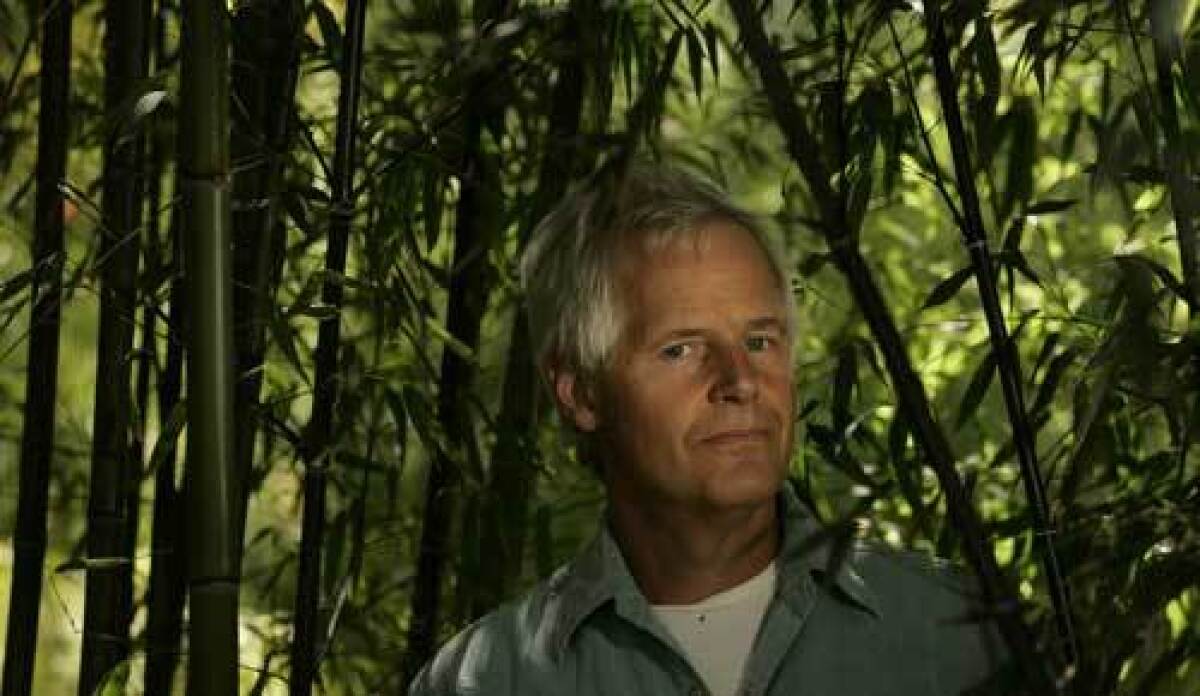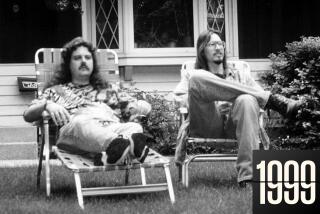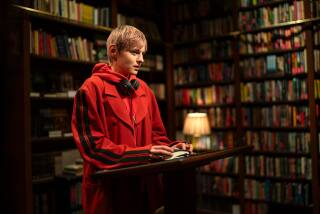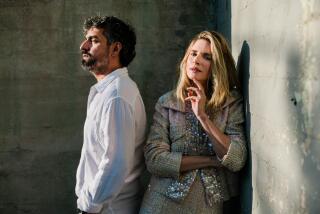Chris Carter gets all foxy about ‘The X-Files’

CHRIS CARTER is not the sort of guy you’d expect to produce shadowy stories about government conspiracies and alien invasions. Even as he’s hard at work finishing “The X-Files: I Want to Believe” -- a new feature film based on the landmark science-fiction franchise he masterminded in the 1990s -- he’s the embodiment of a relaxed California surfer, thoughtful and easygoing rather than tense and paranoid.
The deadline to deliver his cut of the film to the studio is looming, but inside a cozy Malibu residence, he’s calm and deliberate, watching scenes with a critical eye and decisively directing editor Richard A. Harris to alter a particular sequence to enhance its rhythm and pacing.
The scene on the monitors is one that will later appear in trailers for the film, due to open July 25. Looking surprisingly untouched by age over the last several years, special agents Fox Mulder (David Duchovny) and Dana Scully (Gillian Anderson), her signature red tresses grown out past her shoulders, stand amid a snow-covered landscape talking with a mysterious man with shaggy gray hair played by Scottish actor Billy Connolly. Something unsettling is taking place, but what, exactly?
Carter won’t comment. In fact, neither he nor Frank Spotnitz, the series’ former show runner and the movie’s producer, will reveal anything about the film -- except that, chronologically, it picks up six years after the series ended in 2002 and is a stand-alone story that they very much hope will please fans of the show while also appealing to a new audience. Amanda Peet and Xhibit costar, and the film is rated PG-13, with Carter making assurances that it is both “smart and scary.”
But what’s the nature of Mulder and Scully’s relationship? “You’ll have to watch the movie.” Is it safe to say there are other actors from the series who appear in the film? “It’s not safe to say. There may be.” Are there plans for more “X-Files” features? “We’ll have to do a good job on this one.”
Interestingly enough, though, the policy of remaining tight-lipped goes beyond speaking to journalists. Before shooting began in December, only a handful of people -- Carter and Spotnitz, Duchovny and Anderson, a few select 20th Century Fox executives -- had laid eyes on Carter’s script. And before doing so, they were required to sign nondisclosure agreements. During production, the heads of the various below-the-line departments were not given their own copies; instead, they were required to go into a locked room with a video camera if they needed to revisit something from the screenplay.
Roughly 90% of the crew never was allowed to see a copy for fear that the top-secret story line would be leaked. Even the sides, small pages with dialogue from a scene being filmed on a particular day, were collected and destroyed after that day’s shooting.
Area 51 doesn’t have this kind of security.
“We’re very good about being paranoid,” Spotnitz concedes with a laugh.
Revisiting a cultural phenomenon
IT’S A risky strategy. For a time in the mid-1990s, “The X-Files” was one of those ubiquitous pop culture flash points, collecting critical accolades and attracting a rabid fan following obsessed with the characters at the center of the show. Mulder was a man driven to believe in “extreme possibilities,” with Scully acting as his foil, a medical doctor who clings to reason and science and treats her partner with respect but also a healthy dose of skepticism. Their rapport remained constant despite a sprawling story line that at various points involved alien abductions, shadowy government conspiracies, otherworldly bounty hunters and black gummy substances, clones, shape-shifters and a two-headed monster with a passion for Cher.
“The show brought a cinematic quality to episodic television that was lacking,” Duchovny said recently. “The story ideas, week by week, were movie-worthy for the most part. And the style of acting was not campy. For the genre fans, who had followed many shows without those ambitions, it was less ‘We love to love this show’ as it was ‘We love this show.’ ”
The series was, on any number of levels, groundbreaking, not least for spinning off a feature film, 1998’s “The X-Files: Fight the Future,” in the middle of its prime-time run -- the movie received largely satisfactory reviews and topped out at the U.S. box office at just more than $85 million.
But by the time “The X-Files” ended in 2002, Duchovny and Anderson had made no secret of their readiness to move on, and new special agents played by Robert Patrick and Annabeth Gish essentially had taken over as the series’ leads. Particularly after the events of Sept. 11, 2001, audiences seemed less interested in watching stories built on the idea that the American government is deliberately deceiving the citizenry, a theory that the declining ratings seemed to bear out.
By then, Carter was exhausted. Looking for creative and personal renewal, he decided to pursue the host of interests he’d shelved while working not just on “The X-Files” but also on such other science-fiction-tinged programs as “Millennium,” “Harsh Realm” and “The Lone Gunmen,” a short-lived “X-Files” spinoff based on three computer nerds who aided Mulder and Scully from time to time.
“I actually made a point of not watching the show on TV during my time away and doing as much as I could that wasn’t ‘X-Files’ oriented,” Carter says. “For me, it was 10 years of output, and I needed input.”
The Bellflower native climbed mountains and spent time with “big thinkers” at the Kavli Institute for Theoretical Physics in Santa Barbara. He also became a licensed pilot. “Learning to fly an airplane taught me a way of thinking, an approach to problem-solving that was applicable and effective,” he says. “Pilots are very methodical and meticulous, and artists tend not to be.”
What lured him back from the skies was Duchovny -- and slightly more mundane matters. In the middle of last year, right around the time the actor convinced Carter that it might be time to resurrect the franchise, a lawsuit Carter had filed against 20th Century Fox Television over payments allegedly owed to him was settled, paving the way for a second “X-Files” movie.
“I came back because David was very interested in doing this movie; I came back because Frank had a long talk with me, and he was convincing. I came back largely because there was enthusiasm,” Carter offers. “And Fox called and said, ‘If you want to do this movie, it’s now or never.’ With all that incentive, I was convinced that it wasn’t going back, it was going forward, and [it was an] opportunity to actually reconsider ‘The X-Files’ not just for me but for the audience, for the fans.”
He returned to a story idea that had emerged in 2003 and completed a script ahead of the Writers Guild of America strike last November. Additionally, Carter stepped behind the camera to direct the film, shot during the winter largely on location in Pemberton and Vancouver, Canada.
It was another in what he calls “a series of new opportunities” -- he had directed a number of episodes of the show but never a movie before. He says he’s not necessarily looking to reinvent himself as a feature film director, nor is he all that concerned if people continue to associate him most closely with “The X-Files.”
“It’s a natural thing to be labeled,” he says. “It’s my big success. There’s no getting away from that. If I wanted people to take me seriously as something else, it’s my responsibility to go out and do something else.”
Compared to those Manhattan gals
FOR THE time being, “The X-Files” is the only thing on his mind. Several weeks after an initial meeting, the movie is finished, and it is still shrouded in secrecy. In the interim, “Sex and the City” demonstrated that a much-loved television series can relaunch on the big screen after years away from the public eye and be met with the sort of enthusiastic response that virtually guarantees sequels, although it’s difficult to draw too many inferences from that film’s performance.
“Sex and the City” succeeded not just because interest in the characters was high but because it served as an event for female moviegoers whose interests often go overlooked in the summer months.
Audiences also had vague ideas about what actually was going to happen in the movie. “X-Files” has more competition, especially with the moody, brainy “The Dark Knight” opening one week before its release and going after the same core group of older men. That said, the movie is creating buzz online, with fan sites devoted to the sequel carefully analyzing the trailers and hypothesizing about whether Mulder and Scully will wind up together.
Carter puts only so much stock in comparisons, preferring instead to believe that if he and the other creative principals have crafted a sufficiently compelling story, the audience, as they say, will be out there.
“I don’t think people go to the movies saying, ‘Oh, I liked that television show from the ‘90s, I’m going to like this one,’ ” he says. “I think they go to the movies to be entertained or to be scared or to be moved, and that’s why I hope they’re going to see this movie.”
More to Read
The biggest entertainment stories
Get our big stories about Hollywood, film, television, music, arts, culture and more right in your inbox as soon as they publish.
You may occasionally receive promotional content from the Los Angeles Times.







